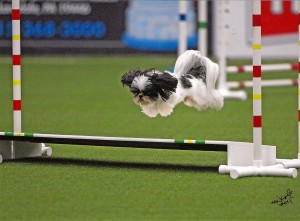 Agility – Running a dog in an agility trial is the ultimate game for you and your dog. In an agility trial, a dog demonstrates its agile nature and versatility by following cues from the handler through a timed obstacle course of jumps, tunnels, weave poles and other objects. It’s an activity that strengthens the bond between dog and handler and provides fun and exercise for both. A handler’s skill in training their dog is tested as the dog must complete the course with as few errors as possible. Scores are based on faults similar to horse show events. Once again as in obedience titles are earned via legs. Titles include Novice Agility (NA) and Open Agility (OA).
Agility – Running a dog in an agility trial is the ultimate game for you and your dog. In an agility trial, a dog demonstrates its agile nature and versatility by following cues from the handler through a timed obstacle course of jumps, tunnels, weave poles and other objects. It’s an activity that strengthens the bond between dog and handler and provides fun and exercise for both. A handler’s skill in training their dog is tested as the dog must complete the course with as few errors as possible. Scores are based on faults similar to horse show events. Once again as in obedience titles are earned via legs. Titles include Novice Agility (NA) and Open Agility (OA).
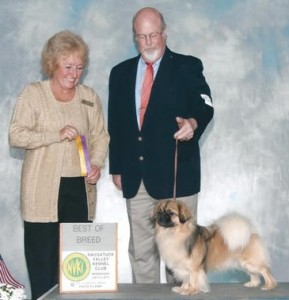 Dog Shows / Conformation – Each breed has established a standard that depicts what the perfect dog in that breed should be like. True breeders are constantly striving to meet that standard or come as close to it as possible. At sanctioned dog shows, dogs are judged to that standard and winners are determined. Dogs are separated by sexes and judged by gender at first and then the best entered that day is chosen from among the winners. Points are assigned to the winners based on the entry size. Dogs and bitches must accumulate the required number of points defined by the sanctioning body (AKC, UKC, etc.) to achieve their Championship and have the right to place a CH. before their name. The dog judged best in breed that day can then go on and compete against all the other breeds in their group and then attempt to be judged the best dog at that show that day.
Dog Shows / Conformation – Each breed has established a standard that depicts what the perfect dog in that breed should be like. True breeders are constantly striving to meet that standard or come as close to it as possible. At sanctioned dog shows, dogs are judged to that standard and winners are determined. Dogs are separated by sexes and judged by gender at first and then the best entered that day is chosen from among the winners. Points are assigned to the winners based on the entry size. Dogs and bitches must accumulate the required number of points defined by the sanctioning body (AKC, UKC, etc.) to achieve their Championship and have the right to place a CH. before their name. The dog judged best in breed that day can then go on and compete against all the other breeds in their group and then attempt to be judged the best dog at that show that day.
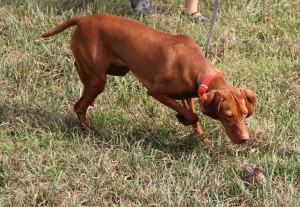 Field Trials – Breeds designated in the Sporting Dog Group are hunting dogs that are especially good at hunting, pointing, flushing and retrieving game birds. Like dog shows, field trials judge a dog’s ability in the field doing the aforementioned abilities. They may run with another dog in what is termed a brace and can be evaluated by judges who may follow on horseback. Winning dogs are assigned points that lead to the title of being a Field Champion or FC to be included to the dog’s registered name.
Field Trials – Breeds designated in the Sporting Dog Group are hunting dogs that are especially good at hunting, pointing, flushing and retrieving game birds. Like dog shows, field trials judge a dog’s ability in the field doing the aforementioned abilities. They may run with another dog in what is termed a brace and can be evaluated by judges who may follow on horseback. Winning dogs are assigned points that lead to the title of being a Field Champion or FC to be included to the dog’s registered name.
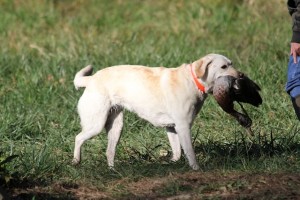 Hunt Tests – These are designed to test a dog’s hunting skills for finding, pointing, flushing and retrieving birds. Their abilities are judged against a standard. They are judged at different ability levels and as they master a level they are elevated to the next level. Generally three titles are achieved beginning with Junior Hunter (JH), followed by Senior Hunter (SH) and culminating with Master Hunter (MH). Again these title names may be added to the dog’s registered name.
Hunt Tests – These are designed to test a dog’s hunting skills for finding, pointing, flushing and retrieving birds. Their abilities are judged against a standard. They are judged at different ability levels and as they master a level they are elevated to the next level. Generally three titles are achieved beginning with Junior Hunter (JH), followed by Senior Hunter (SH) and culminating with Master Hunter (MH). Again these title names may be added to the dog’s registered name.
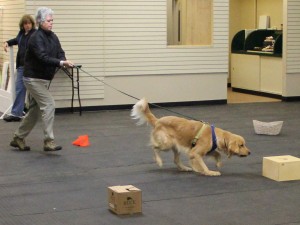 Nosework – The National Association of Canine Scent Works (NACSW) is the governing body for a new sport entitled K9 Nose Work, which originated on the West coast but is making its way across the country. The sport borrows elements from the activities of detection canines and puts them in a recreational setting. This allows dogs to experience the fun, sniffing part of these activities without the risk, liability or requirement of professional canines. Dogs have an amazing sense of smell and a natural desire to hunt and this sport encourages and develops your dog’s natural abilities. Elements of competition include box drills (container search), interior building search, exterior area search and vehicle search. The target odors are Birch, Anise and Clove. Prior to competition the dog must pass an Odor Recognition Test (ORT) on each of the target odors. Titles in this sport are NW1 (Birch only), NW2 (Birch and Anise), and NW3 (Birch, Anise and Clove), as you progress an additional odor recognition is required.
Nosework – The National Association of Canine Scent Works (NACSW) is the governing body for a new sport entitled K9 Nose Work, which originated on the West coast but is making its way across the country. The sport borrows elements from the activities of detection canines and puts them in a recreational setting. This allows dogs to experience the fun, sniffing part of these activities without the risk, liability or requirement of professional canines. Dogs have an amazing sense of smell and a natural desire to hunt and this sport encourages and develops your dog’s natural abilities. Elements of competition include box drills (container search), interior building search, exterior area search and vehicle search. The target odors are Birch, Anise and Clove. Prior to competition the dog must pass an Odor Recognition Test (ORT) on each of the target odors. Titles in this sport are NW1 (Birch only), NW2 (Birch and Anise), and NW3 (Birch, Anise and Clove), as you progress an additional odor recognition is required.
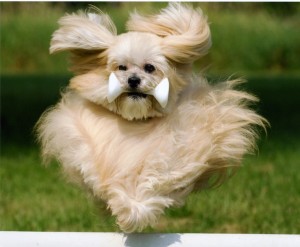 Obedience – Obedience trials showcase dogs that have been trained and conditioned to behave well in the home, in public places, and in the presence of other dogs. Trials allow exhibitors and their dogs to enjoy companionship and competition as they proudly earn titles. Obedience trials can be held independently or in conjunction with dog shows either all breed varieties or breed specialties. Dogs are required to perform exercises most of which are learned at obedience classes conducted by breed clubs, dog training facilities and at many adult community schools. A judge will deduct points when these exercises are not performed with 100 % accuracy. In every exercise a dog must earn 50 % of the points and get a minimum of 170 points out of a possible 200 to qualify for a leg towards his/her obedience title that requires a total of three legs. Obedience Classes include: Novice with Companion Dog (CD) as the sought after title; Open with the title Companion Dog Excellent (CDX); and Utility granting a Utility Dog (UD) title.
Obedience – Obedience trials showcase dogs that have been trained and conditioned to behave well in the home, in public places, and in the presence of other dogs. Trials allow exhibitors and their dogs to enjoy companionship and competition as they proudly earn titles. Obedience trials can be held independently or in conjunction with dog shows either all breed varieties or breed specialties. Dogs are required to perform exercises most of which are learned at obedience classes conducted by breed clubs, dog training facilities and at many adult community schools. A judge will deduct points when these exercises are not performed with 100 % accuracy. In every exercise a dog must earn 50 % of the points and get a minimum of 170 points out of a possible 200 to qualify for a leg towards his/her obedience title that requires a total of three legs. Obedience Classes include: Novice with Companion Dog (CD) as the sought after title; Open with the title Companion Dog Excellent (CDX); and Utility granting a Utility Dog (UD) title.
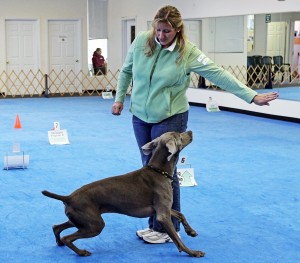 Rally – Rally is a companion sport to Obedience; both require teamwork between dog and handler along with similar performance skills. The dog and handler complete a course of designated stations with signed skills that must be performed. The dog and handler team move at their own pace. A variety of stations are divided into several classes with increasing difficulty and a designed into a course with ten to twenty stations which must be completed. Scoring is not as rigorous as traditional obedience. Communication from the handler to the dog is encouraged and perfect heel position is not required, but there should be a sense of teamwork and enthusiasm as they go through the course. A passing score is required to earn a leg towards a Rally Title. Like Obedience three legs earned lead to titles such as Rally Novice (RN), Rally Advanced (RA), Rally Excellent (RE).
Rally – Rally is a companion sport to Obedience; both require teamwork between dog and handler along with similar performance skills. The dog and handler complete a course of designated stations with signed skills that must be performed. The dog and handler team move at their own pace. A variety of stations are divided into several classes with increasing difficulty and a designed into a course with ten to twenty stations which must be completed. Scoring is not as rigorous as traditional obedience. Communication from the handler to the dog is encouraged and perfect heel position is not required, but there should be a sense of teamwork and enthusiasm as they go through the course. A passing score is required to earn a leg towards a Rally Title. Like Obedience three legs earned lead to titles such as Rally Novice (RN), Rally Advanced (RA), Rally Excellent (RE).
![]() Tracking – Dogs have a very keen sense of smell-100,000 times stronger than humans! Tracking demonstrates a dog’s natural ability to recognize and follow a scent and is the foundation of canine search and rescue work. Unlike obedience and agility trials, where dogs respond to the owner’s commands, in tracking a dog is completely in charge, for only he knows how to use his nose to find and follow the track. The greatest pleasure of tracking is the hours spent outside training and interacting with your dog.
Tracking – Dogs have a very keen sense of smell-100,000 times stronger than humans! Tracking demonstrates a dog’s natural ability to recognize and follow a scent and is the foundation of canine search and rescue work. Unlike obedience and agility trials, where dogs respond to the owner’s commands, in tracking a dog is completely in charge, for only he knows how to use his nose to find and follow the track. The greatest pleasure of tracking is the hours spent outside training and interacting with your dog.
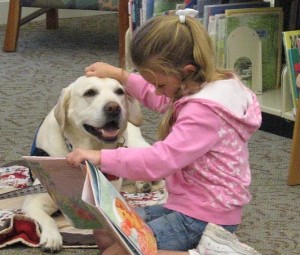 Therapy Dogs – A therapy dog and his handler provide company, comfort to those who may so need it as patients in hospitals, assisted living complexes, nursing homes, children’s reading programs in libraries / schools and any other type of institution that might benefit from their visits. Benefits include emotional well being, healing, and an overall improvement of quality of life.
Therapy Dogs – A therapy dog and his handler provide company, comfort to those who may so need it as patients in hospitals, assisted living complexes, nursing homes, children’s reading programs in libraries / schools and any other type of institution that might benefit from their visits. Benefits include emotional well being, healing, and an overall improvement of quality of life.